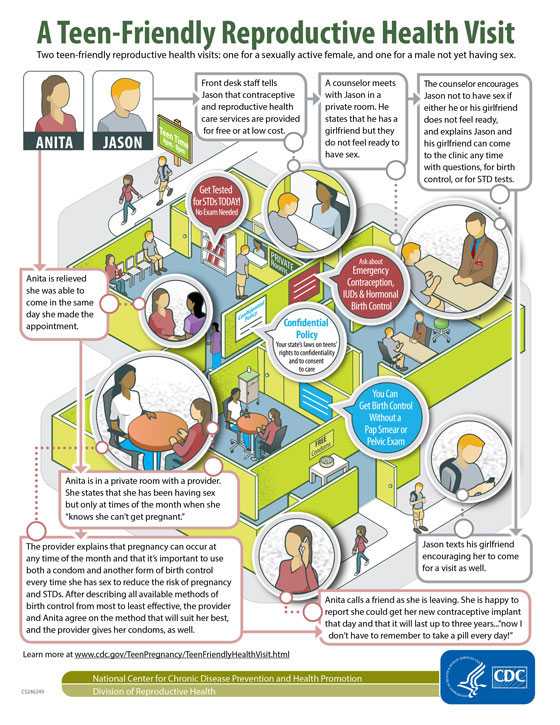Teens Visiting a Health Clinic

Download Infographic: A Teen-Friendly Reproductive Health Visit [PDF-1.9 MB]
Confidentiality
- Teens receive clear information about their state’s laws governing the rights of adolescent patients to confidentiality and to consent to care or treatment. A teen’s health information cannot be shared with anyone—including parents or guardians—without the teen’s written permission, unless required by law or if the health care provider is concerned the teen might harm him or herself or someone else.
- Health information disclosed or discussed during a visit is confidential, consistent with state laws and regulations.
- Billing procedures maintain teen’s confidentiality. If this is not possible, the provider or billing staff advises the teen about the potential breach of confidentiality and provides options. For example, the patient might want to pay out of pocket, or sensitive lab services like pregnancy and STD tests may be indicated on the bill as “routine screening.” However, some health plans might not reimburse unless a service is fully itemized.
Privacy
- The provider has a counseling area to discuss sensitive topics with teens that provides visual and auditory privacy. For example, other health care staff or clients cannot hear the conversation or see who is participating
- The health center has an examination room that provides visual and auditory privacy.
- At every visit, each teen patient has time alone with a provider to discuss or ask questions about contraceptive and reproductive health concerns, regardless of whether the visit is urgent or preventive.
- Staff members do not discuss teens’ information in common office spaces.
- Medical records are kept secure and are accessible only to select health care staff, such as through the use of locked files, or password-protected electronic medical records.
Consent
- Teens receive clear information about informed consent—their right to complete and understandable information about their care and medical procedures, and to give permission to receive medical care related to contraceptive and reproductive health.
- Teens receive clear information that confidential contraceptive and reproductive health services are available without the need for parent or caregiver consent, consistent with state laws and regulations.
Cultural and Linguistic Appropriateness
- The health center environment and staff leave teen patients feeling respected and engaged in their health care.
- Culturally competent care is provided, meaning all care is sensitive to and respectful of each teen’s culture, ethnicity, community values, religion, language, educational level, sex, gender, and sexual orientation.
- The care provided addresses the unique biologic, cognitive, and psychosocial needs of adolescents.
- Conversations between teens and providers are two-way, where teens feel respected and not judged.
Comprehensive Services
- Teens are informed of all contraceptive and reproductive health services available at the specific health center; a referral is provided for any contraceptive or reproductive health services that are not available at the specific health center.
- Teens’ contraceptive and reproductive health needs are assessed at every visit.
Counseling is provided on all methods to prevent pregnancy, in order of effectiveness, starting with the most effective. - A wide range of contraception is available via prescription or dispensed on site, including IUDs, hormonal implants, hormonal contraceptive pills, the patch, and ring.
- The provider promotes “Dual-protection”: using a condom for STI/HIV prevention and a highly effective birth control method for pregnancy prevention at the same time.
- Quick Start methods are used for initiation of hormonal contraception and IUDs, such as starting the pill or inserting the IUD on any day of the month.
- Emergency contraception is available to male and female adolescents, either by prescription, dispensed on site, or prescribed for future use.
- Female teens can receive hormonal contraception without prerequisite exams or testing, such as Pap test, pelvic exam, breast exam, or STD testing.
- Teens receive STD/HIV counseling, testing, and treatment without having an exam.
- Human Papillomavirus (HPV) vaccine is available and offered when appropriate.
- Mental health, substance use, violence, and other health concerns are assessed and appropriate referrals are made.
Parent/Guardian Involvement
- Each teen has an opportunity for examination and counseling without parents or guardians present, and the teen’s privacy is respected.
- Parents and guardians are informed of the health center’s standard procedure for the provider to spend time alone with teen patients to discuss their comprehensive health and wellness.
- The provider encourages the teen to involve parents or guardians in the teen’s health care decisions.
- Parents receive clear information on their teen’s right to confidentiality, privacy, and informed consent.
- Parents receive medically accurate information and resources on contraceptive and reproductive health, as needed or as requested.
- Parents receive resources on parent-teen communication and adolescent health and development.
Sources:
American Academy of Pediatrics. AAP Textbook of Adolescent Health Care. 2011;427–643.
ACOG Cervical cytology screening [PDF - 104KB].
CDC Emergency contraception: policy statement
Minors and the right to consent to health care [PDF - 336KB].
CDC STD Treatment Guidelines, 2010—HIV Infection: Detection, Counseling, and Referral.
CDC STD Treatment Guidelines, 2010—Special Populations
An Overview of Minors’ Consent Law [PDF -221KB].
Minors’ Access to STI Services [PDF - 206KB].
Beliefs about Papanicolaou smears and compliance with Papanicolaou smear follow-up in adolescents.
A national survey of clinic sexual histories for sexually transmitted infection and HIV screening.
Features of sexually transmitted disease services important to African American adolescents.
Patients like us": pregnant and parenting teens view the health care system.
Confidential billing accounts for adolescents in private practice.
Effect of mandatory parental notification on adolescent girls’ use of sexual health care services.
Access to health care for adolescents and young adults [PDF - 43KB].
- Page last reviewed: September 5, 2013
- Page last updated: September 5, 2013
- Content source:


 ShareCompartir
ShareCompartir